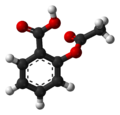Aspirin facts for kids
Aspirin, also known as acetylsalicylic acid, is a common medicine. People use it to help with pain, reduce fever, and lessen swelling in the body. It also helps prevent blood clots. This makes it useful for stopping heart attacks. Aspirin is one of the most widely used medicines around the world.
The Story of Aspirin
Aspirin was first made in Germany in 1897. A company called Bayer has a special trademark on the name "Aspirin" in 80 countries. This means only Bayer can sell the medicine using that specific name in those places. But in many other countries, "Aspirin" is just the common name for this medicine.
How Aspirin Helps Your Body
Aspirin is used for several important things:
- Pain Relief: It helps to make many kinds of pain feel better. This includes headaches, muscle aches, and other common pains.
- Fever Reducer: If you have a fever, aspirin can help bring your body temperature down.
- Reducing Swelling: It can also lessen inflammation, which is when parts of your body become swollen or red.
- Stopping Blood Clots: Aspirin has a special effect on your blood. It makes it harder for platelets (tiny cells in your blood) to stick together. This helps prevent blood clots from forming. Because of this, doctors sometimes recommend aspirin to help prevent heart attacks.
Images for kids
See also
 In Spanish: Ácido acetilsalicílico para niños
In Spanish: Ácido acetilsalicílico para niños

All content from Kiddle encyclopedia articles (including the article images and facts) can be freely used under Attribution-ShareAlike license, unless stated otherwise. Cite this article:
Aspirin Facts for Kids. Kiddle Encyclopedia.




